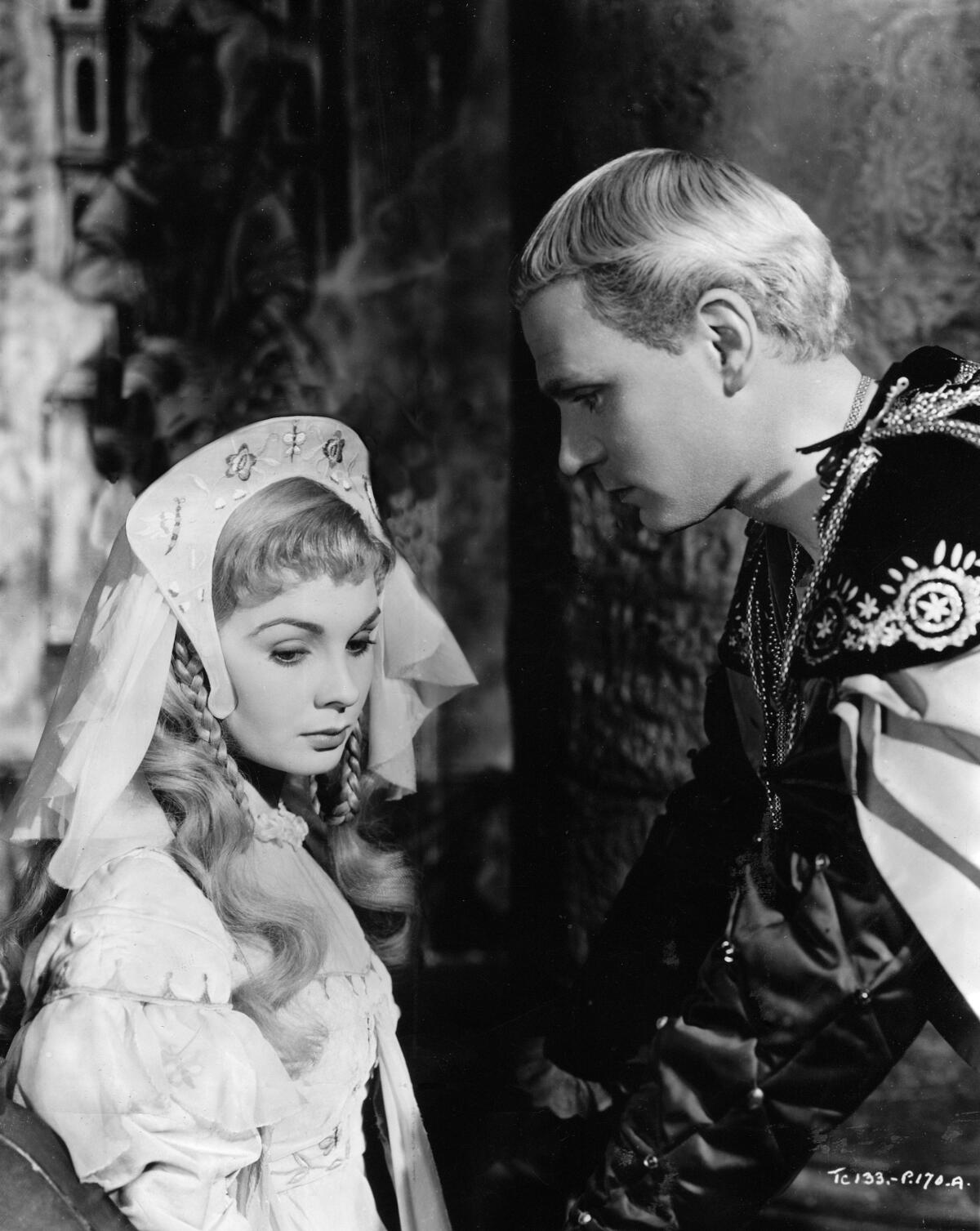From the Archives: ‘Hamlet’ a momentous triumph for Olivier

- Share via
Laurence Olivier meets the challenge of Shakespeare on the screen magnificently in “Hamlet.” He has constructed a film version of the Bard’s most famous tragedy that is epochal. As producer, director and actor he has performed a triune duty that is nothing short of momentous, and the presentation he has created will unquestionably be a model for all future efforts in the difficult classic poetic realm, even as it is now path-breaking.
In any estimate of this “Hamlet,” which had its premiere last night at the Four Star Theater, one must naturally view the total accomplishment. The finer elements of the production center in the splendid bridge that Olivier has built between the traditional and established world of the stage and the still comparatively young medium of the motion picture.
Some defects
That he occasionally has erred in results is to be anticipated. Some of the action is too blatant in its theatricalism. Encounters between scoundrel king and vengeful prince are so obvious that they sometimes strain at plausibility. Scenes shift so swiftly that time lapses are frequently hardly fully accounted for. Occasionally the picture seems to give too large a place to the patent vulgarities of Shakespeare and the suggestive innuendoes in the dialogue.
But far and away above these smaller demerits there is the great power shown by Olivier in his entire conception of “Hamlet” for the films, his readiness to try to measure up to the demands of a different format, his amazing maintenance of interest in his plot and characters, even at the sacrifice of a finesse that might please the hypercritical but would not, perhaps, build toward a larger general audience.
Soliloquy transposed
His “Hamlet” is great because it is essentially “Hamlet,” and because he is a courageous and competent innovator whenever he departs from the known highway into unknown detours that surprise with their excellence.
He transposes the “To Be or Not to Be” soliloquy from its original place in the unfoldment, but none will deny the effectiveness of this expedient. It should normally precede the terrific emotional scene with Ophelia that it follows.
But then Olivier would have no reasonable cause to read the speech from a tower overlooking the churning sea, with the threat of death not simply in the dagger in his hand, but in the entire environment. That can be called a stroke of genius.
The cast that he has brought together is of the finest. Basil Sydney, as the somber fear-haunted, brooding king is type perfect. Felix Aylmer is the ideal emblem of the busybody as Polonius. Eileen Herlie’s stirring emotion as the Queen contributes to film history.
Portrayal interests
Jean Simmons is a strange, wraithlike-Ophelia who seems to lose her beauty with her madness, it is a delicate juvenile portrayal, more unreal than some of the others, but exceptionally interesting.
In the wake of the others come such able actors as Terence Morgan as Laertes, Norman Wooland is Horatio, Peter Cushing as the amusing and factitious Osric, Stanley Holloway as the Gravedigger and various others. The voice of the ghost is indeed sepulchral, and the entire mood of his manifestation on the heights of the castle is rich in photographic fantasy.
Now and then the pictorial effects in Olivier’s “Hamlet” seem to be too greatly thickened. He probably has the justification that he is attempting to reach the popular audience. He should capture that public with the sensational fire of the acting by himself and the others, the vibrant ironic humor that lurks natively in the Shakespearean lines which he extracts for its full impact, the fact that within limitations of setting he has managed an unusual amount of movement. While there is a sense of forced trying in some scenes for such animation, it is efficient nine-tenths of the way.
“Hamlet” will undoubtedly be compared with Olivier’s “Henry V” by those who observed the earlier Shakespearean enterprise. It represents advancement in many respects, and it should inherently possess a far greater attraction.
Quality audience
The initial audience, in which the professional element was well represented, gave the film a fine and admiring attention. It was an attendance of quality, as was to be expected for an initial showing under the auspices of the New York Theatre Guild.
Music, it might be noted, is employed with splendid effect in this Two Cities production, with the score credited to William Walton.
More to Read
Only good movies
Get the Indie Focus newsletter, Mark Olsen's weekly guide to the world of cinema.
You may occasionally receive promotional content from the Los Angeles Times.










